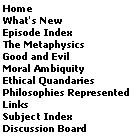 |
|
 |
|
|
|
|
|
|
|
|
|
|
|
|
|
| Warning: this page contains info about episodes up through season 4 BtVS/season 1 AtS. If you're in danger of being spoiled, proceed with caution. |
The meaning of "five by five"
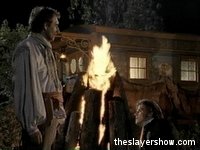 |
An Angel is born: Angelus had a special hankering for gypsy flesh, and when he was given a gypsy girl as a gift by a doting Darla in 1898 Romania, he fed on her for Darla's pleasure. When Darla sees him again, he has been cursed. Darla infers from his obsessive remorse that he is under a spell, which he is of course, but it is not a spell that will temporarily influence the thoughts of his demon psyche. The gypsies have given him a new psyche--they have put back something that was missing. The curse has changed who and what he is. Darla is horrified when she realizes that Angelus has "a filthy soul" |
(how she figures this out so quickly may have something to do with the equation of the word "soul" with "conscience"). He is a monster in her eyes now, an abomination among abominations. Souled Angel takes this verdict to heart for his own remorseful reasons, screaming, "I'm a monster" to his would-be victims.
The invitation to vampires : How did Angel get in the pimp's apartment? Since the pimp isn't dead, we have to assume that Faith, as its new "resident" (the one with keys, although without her name on the lease), has the right of invitation. Faith obviously wanted Angel to enter the apartment. Wesley's abduction was the invitation. After that it was a matter of waiting for Angel to find her.
During the conversation between Faith and Angel in the front office, she says that she is giving him a shot at her "an open invitation" (k. parnell 8 May 2000 22:24).
Note: The invitation is for Angel to try to kill her, not to visit her new home, but she is waiting for both during the Wesley torture-session.
...the real owner probably gave permission. They may have went to see him & said "Hey, we'll get your stuff back , is it okay if we stop by your pad?" or something (Myslayre, Apr 25 19:08 2000).
Good and Evil in "5x5/Sanctuary"
Poetic justice: When renegade slayer Faith arrives in L.A. looking like the homeless run-away that she is, she beats up a pimp waiting to seduce her into a life of prostitution, steals his money, keys and jacket, and moves into his apartment.
Wolfram and Hart are defending a man charged with drug dealing and murder. They argue that the case against him is based on the testimony of witnesses the prosecution cannot produce. Then Angel walks in with Marquez, the witness Wolfram and Hart tried to do in with demon hit-men. The corrupt counselors decide it's time to get rid of the pesky souled vamp once and for all.
It's unclear how they know Faith's a slayer, much less a rogue. Presumably, the police reports make note of a girl with extraordinary strength who isn't afraid to use it in committing violence. They offer to free Faith of the charges she racked up in Sunnydale if she dusts Angel. When the licentious lawyers find out Faith is staying at the still-undead Angel's apartment, though, they put Faith on the hit-list. But the second assassin fails to assassinate the first assassin, and so they sic Kate on Angel, telling her that he is hiding the fugitive Faith.
The triumvirate of Wolfram & Hart lawyers seem to embody different facets of evil...
- Lee Mercer - the thin, smooth-voiced lawyer whom Faith forcibly introduced to a table - initially appeared in "Sense and Sensitivity". His austerity and seeming lack of emotion is in stark contrast to the tools he employed in that episode, and in FbF he easily (intentionally?) brings out the rogue Slayer's infamous rage. He manifests the base impulses that can so easily overpower us - as, in Faith's case, they already have.
- Similarly, Lilah Morgan, who was introduced in "The Ring", is the very personification of temptation. Having failed to persuade Angel to co-operate with promises of freedom, it is she who first propositions Faith, again using material comfort and opulence as leverage in exchange for services rendered - the limousine, her diamond watch and so forth.
- And finally, Lindsey MacDonald Russell Winters' attorney in "City Of" - is demonstrably coercive, speaking of acquisitions and triumphs over competitors. He is also the only one ever to challenge Angel directly, as in the pilot and FbF...
... Faith falls foul of the desires... portrayed by the solicitors, that Angel has already faced and defeated. [When] the three W&H reps ...put their proposals to Faith; it plays out almost as if she is surrendering to her own darker self (B. Gorman, 7 May 2000 22:09).
Moral Ambiguity in "5x5/Sanctuary"
Wesley is plagued with guilt when Angel blames him for Faith's lack of trust. Wesley wants to help Angel defend himself from Faith, but Angel only sees Wesley's past with Faith getting in the way. Does Angel have a point? What are Wesley's true feelings about Faith? He tells Angel and Faith of his belief that Faith can be redeemed. But after Faith tortures him, he uses his one chance to speak to call her "a piece of shit."
Faith has a lot of screwed-up ideas about people's motives, and little surprise why. If she were to actually trust someone's good intentions or feelings, she might be disappointed. Again. For her, there are no real connections between people, only games and players. But when Angel refuses to play her cat-and-mouse game, Faith is forced into giving Angel reasons to fight her. She kidnaps Wesley, but must still attack Angel directly to get him to fight. Angel's refusal to defend himself brings out her deepest purposes--her attempts to kill him have been half-assed attempts to get him to kill her. "I'm bad!" she screams, echoing Angel's own self-image back to him. Seems Faith is afraid to trust herself as well.
I don't think she wanted to die, she just didn't want a soul anymore. ...Faith's conscience was reawakened when she was in Buffy's body. And she didn't like what it showed her about herself and what she'd become. The more regret she felt, the more evil she did to try to convince herself that she didn't care and it didn't matter. At the end she was begging for Angel to take away her soul so she wouldn't care anymore (Closet Buffyholic, Apr 26 8:09 2000).
Kate: Since finding out about demons, Kate has made it her job to investigate the supernatural underworld of Los Angeles. This work is not merely a place to focus her grief over her father's death; Kate sees this element of crime in the city as her personal responsibility.
...all humanity is in danger and anyone who finds out what is really going on has a responsibility to do what they can to protect mankind... if the Scooby's are obligated to defend humankind because they are in the know then Kate is even more obligated because 1) she is a peace officer who has sworn to risk her life to protect the public and 2) the demons are breaking human laws and she is the only one in the police force who really knows what is happening - she needs to protect her fellow officers from their own ignorance as well as innocent civilians.
Accomplishing this isn't easy, though. The police department isn't exactly going to put her in charge of the L.A. "X-files" and bring all the new demon cases to her attention. Instead, Kate is keeping her self alert to crimes with "a paranormal bouquet". Kate goes to the scene of Faith's torture of Wesley because she's heard that a supernaturally-strong female was reported as the suspect.
Then she finds out that Angel is hiding the wanted murderer, Faith. He has officially put himself on the wrong side of the law. This brings out her well-trained disdain for vigilantism. Even if Kate knew Angel's history with Faith, or his desire to redeem her, it wouldn't matter. The plain fact is, a supernaturally powerful citizen with a murderous past has taken the law into his own hands and may do so again if it suits his purposes. Lindsey plays on this fact when he tells Kate that
"creatures like those who killed your father put themselves beyond human law."
No matter who the messenger is, Kate doesn't hesitate to arrest Angel for aiding and abetting a wanted felon.
Buffy, anger girl: When Angel takes on the task of redeeming Faith, Buffy threatens Faith, hits Angel, and throws his murderous past in his face. When he tells her that his work has nothing to do with her or her desire for vengeance, she tells Angel about Riley, and how she trusts Riley more than him.
|
Ethical Quandaries in "5x5/Sanctuary" What to do with Faith? |
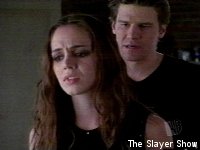 |
Angel argues that they have a moral obligation to save a human soul no matter what personal reasons they might have against it. To decide that some souls are worth saving and some aren't is to play God.
Wesley believes Faith should be punished--although perhaps not by the California justice system, which would be ill-equipped to deal with an uncooperative slayer. He believes that Faith is evil, and that Angel's attempt at redemption is coddling her. It doesn't matter if she claims to want help--she won't change.
Angel believes Faith can change. When she took the dark path in Sunnydale it was because she thought that flirtation with evil would not touch her. She found out differently, which proves she is not sociopathic. She can feel remorse for the pain she's caused. Despite his sympathy, Angel still believes she must live up to the consequences--emotional and moral--of the things she has done. This is, in fact, the key to her redemption.
The Watchers
"She has power and the willingness to use that power for evil. She must be stopped."
As Wesley questions his loyalties and his feelings, he is approached by the Watcher Operations team that is after Faith. They offer him a position on the Council again if he helps them get Faith away from Angel. They claim to want to rehabilitate her. Wesley realizes where his loyalties are when he hears their black-and-white opinions about the vampire Angel.
Buffy: Angel tells Faith that many people will not forgive her for what she did simply because she feels remorse for it, or tries to make amends. Buffy turns out to be one of these people. She arrives in L.A. ready to defend Angel from Faith only to find them together. When Angel sees Buffy's anger, he defends Faith. Buffy cannot understand this, and Angel accuses her of coming to L.A. to get revenge--which she does not deny. She feels entitled to it. Buffy wants to see Faith punished, by state law or slayer law. She also believes Faith is playing on Angel's sympathies, and will not change. (Buffy vs. Angel, Buffy/Angel vs. the Watchers--a larger view)
Angel refuses to let even Buffy's feelings interfere with what he is doing. If he is to stick by his principles on equal-opportunity soul-saving, her feelings must be irrelevant. But is Angel all about removing personal bias in whom he helps? Buffy is right about one thing--he identifies with Faith. He sees himself in her.
The circumstances under which they turned evil are entirely different and their return to having a clear conscience is also different. The killings that Faith carried out were entirely her own judgment whereas Angel's was governed by his vampiric nature (Wanchai, May 5 16:37 2000). Does this argument work?
Faith is not sure she's ready to be saved, either. She still feels rage. She feels incredible guilt. In the end, she decides her own fate, by going to the police station and making a confession.
The Invitation to Vampires: What makes a dwelling a home? Faith's hotel room in Sunnydale was never invitation-protected, even though she lived there for months. Vamp invites into college residences has been depicted as iffy. Vampires make nests for themselves in old abandoned buildings and factories. Yet they can't enter the kid's living area, also in an abandoned building--the vamps must force Alonna out into the day light to kidnap her, and Angel must force an invitation out of the sucky guard. All we can assume is that dorms and hotel rooms are established to be transient residences, while the kids had been living in their building a long time and considered it their home.
Demon sex: Just what do you suppose goes on in a demon brothel, anyway? We know that some demons procreate in human ways (e.g., Doyle's daddy), so maybe it's the usual business. Or, from the look on Wesley's face when he sees the blackmail photos, maybe not. Or maybe those demon babes just like to up the kinks.
Good and Moral Ambiguity in "War Zone"
Gunn is the hot-headed but courageous leader of a band of street kids. When his war against the local vampire gang gets his sister turned into a vampire, he accepts full responsibility for the consequences.
He ...possesses remarkable strength of character. ... Look at what's happened when the Scoobies have run into familiar faces with hearts no longer beating. Angelus, Evil Willow, etc. They weren't able to look past the physical resemblance and see the true demon behind the image. Gunn was. As much as it pained him, he knew in his heart that that wasn't his sister. He somehow found the fortitude to raise that stake and kill the vampire that she had become (Kristen Reidel , The WB Scoop 5/10/00).
Why does Angel introduce himself to the head vampire as "Angelus"? See re: vamp with the long, bad reputation. Angel needs to scare the other vamps into doing what he asks--leaving the kids alone.
Racial-socio-economic subtext: An interesting tension is created when the leader of the vampire nest spouts skin-head-style rhetoric that disdains the "street trash" (lead by a minority), while lamenting the loss of their helpless "hard working" victims who are long dead or gone from that part of town. And Gunn has as much trouble with Angel being a middle-class (?) white guy as he does with Angel being a vampire. To Angel's credit, he gives up any presumption of lecturing Gunn, and only asks for Gunn's help in the future.
Has Cordelia outgrown her Sunnydale shallowness? When she's tempted by David the Dungeons and Dragons billionaire who can't get dates without paying for them, you have to ask.
Cordy is delightfully transparent. She wants to be a part of the in crowd again. She wants to live the jet set life she took for granted. The problem is all of the horrors she's seen have given her some depth. As much as she would love the ability to return to her former shallow self, she is no longer a person capable of prostituting herself for a paltry couple of billion (Kristen Reidel).
How does Wesley know about Madam Dorian's? Was it really Watcher's Council stories? Or just "stuff you pick up on the streets" from his rogue demon hunter days? ...a visit or two to the brothel might explain how he suddenly learned how to kiss over his summer vacation (Kristen Reidel).
The Metaphysics of "Blind Date"
Vanessa Brewer: Angel comes across an ultra-strong blind woman who can anticipate his moves. But Vanessa isn't totally blind. She sees energy ("electro-magnetic") sources that are normally outside the range of human vision, and can sense objects in motion without looking (e.g., when she catches her glasses in the courtroom). Her condition was self-inflicted. She spent 5 years in Pajaur studying with the Nanjin, an order of cave-dwelling monks who believe that enlightenment is "seeing with the heart, not the mind." This puts her at a disadvantage when she battles the clever vampire later, however.
...Angel's body temp is close to room temp, which would make a vampire a much harder target for her "infrared sense" to track. Something that Angel... pick[ed] up on in mid-fight (C. Hirsch, May 17, 2000, 8:34 am).
Seers: Vanessa is an assassin for Wolfram and Hart. Her current job is to kill three blind children. Each was found in different parts of the world, but together they can perform powerful acts of telepathy, a power that will increase with age. This makes them a threat to the evil law firm, who only want telepaths working to their own advantage. The children have been brought to the United States to meet a mentor who will train them. They have an important role to play in the coming fight against evil.
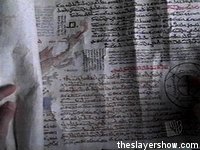 |
Prophecy Boy: When stealth-guy Angel breaks into the vault at Wolfram and Hart, he is drawn to an ancient scroll, and takes it with him when he leaves. Wesley translates the ancient Aramaic text and discovers that it is the long lost Prophecies of Aberjian. This text was written 4,000 years ago in a dozen different languages, both human and demon. It speaks of the seer children and a vampire with a soul. If this is indeed about Angel (it never mentions him by name), it changes the map for Angel's "calling". It means he is no longer simply a lucky find by the Powers That Be--a vamp that had a happenstance run-in with some pissed-off gypsies. It means that in some sense, Angel's un-life was predestined, foretold centuries before his human self was even born. |
Demons: Wolfram and Hart employ all manner of nasty critters, demon and human. For the purposes of physical security, demon power comes in handy. They have a demon shaman that can sense when vampires enter the premises, and a demon guarding their vault. The most powerful employees still appear to be all too human, however.
Evil, Moral Ambiguity, and Philosophies Represented in "Blind Date"
Vanessa Brewer has a record with the LAPD, and rightly so. She is not just a violent assassin; her tendency to get caught actually makes her a Wolfram and Hart client as well. We are never told why she does the things she does (since Holland told Lindsey to "set up" a tragic childhood for Vanessa to pre-empt the coming murder charges, it is unlikely she actually had one). Some people are just evil.
Beyond good and evil: It's harvest season at Wolfram and Hart, when they separate the wheat from the chaff. While both Lindsey and Lee do things the brass doesn't approve of, Lindsey is kept on while Lee is shot in the back of the head. So what's the diff here? A random employee mind-reading revealed that Lee had already made up his mind to leave and take some important clients with him. It was an easy choice for him. He was a real threat, aligning himself against the firm. Lindsey isn't sure what to do. He is still trying to decide if he believes in the firm's philosophy of life:
The world is designed for those who know how to use it, those who can control themselves and others. You must find your role in the scheme of things--you are either the user or the used.
In this philosophy, "good" and "evil" are categories invented by the losers to feel better about their lot in life, their lack of "balls", as it were.
Lindsey still believes there is such a thing as real good and real evil, as evidenced by his defection from the law firm when his job becomes defending a would-be murderer of children. But the Wolfram and Hart outlook is tempting to him. He doesn't want to be helpless in the world, like his father was. His early experiences seem to confirm the W&H view of life.
| Enter Holland. Holland Manners is Lindsey's boss, the division head of Special Projects at Wolfram and Hart (not one of the senior partners). He calls Lindsey's doubt "a crisis of faith"--faith in the W&H philosophy. Holland has no such doubts himself. His talk of Lindsey finding his "place in the world" assumes outright that Lindsey has two choices--user or used. The courageous choice, for Holland, is to become the former, a Nietzschean Master rather than a Slave--as most of the masses are. When Lindsey betrays the firm and allies himself with Angel, he is showing his mettle as a potential Master. Holland gives him a choice. |  |
There is no choice outside the paradigm of Masters and Slaves. At least not for Lindsey McDonald. He chooses to stay.
Can Lindsey McDonald be redeemed?
I don't think Lindsey will ever be redeemed. He understood the choice he was making. Contrast him to Faith, who followed her instincts, her anger, but never truly faced the choice she was making. Faith, like Angel, has to learn to use her heart and mind to control her instincts. But Lindsay made the choice WITH his heart and mind (lucille, May 24 11:13 2000).
I caught more than a hint of intimidation in the way Holland and Lilah were dealing with him - particularly Lilah's liver crack. I think Lindsay isn't sure that he could just walk away from the firm. As he said to Angel, he didn't know who was going to have the power when it all shakes out. Right now Lindsay thinks Wolfram & Hart will have the power - and let's face it, Angel wasn't exactly warm and welcoming to him when he decided to turn to the Light Side last week. My bet is that Lindsay will have many more 'crises' of 'faith' before he finally settles on a side. No one gets just one chance to choose evil or good. We choose every day in thousands of small decisions (guilty pleasures, May 24 13:00 2000).
Angel sees the Holland's "reality" as a social construction--it is not the way the world invariably is, but the way evil people in power, like Holland, have made it. It is "structured for power, not truth." But it doesn't have to be that way. He and other warriors of good have been called by the Powers that Be to fight against the evil order. Not an easy task, since the game has been set up with their rules. For example, Angel can't testify to a murder he witnessed in court, because they would find some way to discredit him or destroy evidence. He is angry at the PTB's for expecting him to battle under such conditions. He is also envious of Wolfram and Hart's "clarity of evil"--the pure lack of guilt he once had as Angelus. One can see the brief alliance that gets Angel into the vault where the scrolls were hidden as the PTB's answer to Angel's angst.
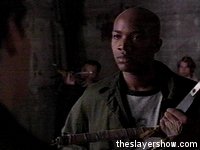 |
Gunn helps Angel get into the firm's office building by causing a disturbance and providing a vampire decoy. But talking him into helping isn't easy. Gunn is not motivated by "some rich guy's heartbreak", i.e., Lindsey's struggle over the kids being killed. He only agrees to help when Angel tells him the job is dangerous. Didn't his sister say something about him liking to flirt with death? |
The Metaphysics of "To Shanshu in LA"
The ritual to raise Vocah: Two evil monks throw a powdery substance in a circle marked on a patch of grass:
This hallowed ground is made ready.
His time is at hand, for as it is written, he of pure darkness shall come into the light.
The ground shakes, The circle flames. A demon rises from it in a hood and mask that hides a face in decay.
Vocah, warrior of the underworld, has been summoned by Wolfram and Hart to separate Angel from the PTB's, which he does with step-by-step precision.
The destiny of "the vampire with a soul" was hinted at by the Oracles in IWRY. Wesley translates "shanshu" initially as "death". This translation was wrong, but it made sense because of the double-meaning the word "dead" takes on with vampires--a vampire can die (*poof*). But shanshu's earliest meaning is "live until you die." Hence the prophecy goes, "the vampire with a soul, once he fulfills his destiny, will shanshu"--become alive and die, in other words, he will become mortal. This is the vampire with a soul's reward. "...it won't happen tomorrow or the next day," Wesley explains. "He has to survive the coming darkness, the apocalyptic battles, a few plagues, and several ...fiends that will be unleashed."
Interesting side note on the human word "shanshu"
Shanshu was the ancient [Chinese] practice of secretly performing good deeds and accumulating virture and therefore securing benefits within this lifetime. Sounds kind of like what's gonna happen to Angel (Nava, May 23 22:37, 2000).
Resolution of the Shanshu prophecy?
The unbinding incantation: Cordelia made a joke when she asked what the prophecies of Aberjian said about her, but she may be in them. The GhostOracle tells Angel that the cure to Cordelia's madness is in the words of Anatole, a section of the scroll. Wesley reads the words at Cordelia's bedside, words that seem to refer to Wesley as well:
And if the beast shalt find thee, and touch thee, thou shall be wounded in thy soul, and thou shall know madness, and the beast shalt attack and cripple thee, and thou shalt know neither friend nor family. But thou shalt undo the beast, thou shalt find the sacred words of Anatole, and thou shalt be restored. Three times shalt thou say these words: unbind, unbind, unbind
The room fills with light, and the tattoo disappears. Cordelia is coherent again. Whether they are in fact in the prophecies depends on whether this was a particular event Wesley is reading about or a general cure to Vocah's mark.
The revivification ritual (AKA The Raising): Most vamps don't leave their bones behind when they pass on. Darla ended up on the business end of a janitor's broom and dust pan after Angel staked her. Bringing her back requires lots of chanting and five vampire sacrifices in chains. Wolfram and Hart's evil monks place a wooden cage in the middle of a mausoleum (consecrated ground) and anoint it with oil and human blood.
Vocah reads from the Prophecies of Aberjian:
As it was written, they shall prepare the way, and the very gates of hell shall open. That which is above shall tremble, for that which is below shall arise. And the world shall know the beast, and the beast shall know the world.
Vocah: Five are without breath. Monks: Yet they live.
Vocah: Five are without time. Monks: Yet they live.
Vocah: Five are without soul. Monks: Yet they live.
Vocah: Five are without sun. Monks: Yet they live.
Vocah senses Angel. Lindsey continues the ritual: Five are dead. Monks: Yet they live.
He continues in Latin:
Et illi quinque sacrificium est. Et ille qui mortuus vivet.
Translation: And the five shall be a sacrifice. And the one who is dead shall live.Dum vita et mors non duas res sed una sunt. In tenebris lux est. In luce tenebrae sunt. Surge! Surge! Surge! Surge! Surge! Surge! Surge!
Translation: Even as life and death are not two things but one. In darkness is the light, In light is the darkness. Arise! Arise! Arise! Arise! Arise! Arise!
A wind starts up that dusts the vampire sacrifices. Ashes and vampire bones whirl around the cage and enter it. A light explodes out from inside the cage.
...there were five vampires chained to the box. They vanished when the spell was complete. Raw materials for making a new body (BH Perry, May 25, 2000, 3:47 pm).
The metaphysics of being human
Good and Evil in "To Shanshu in LA"
Vocah is a classic warrior of evil.
Lindsey has made the choice he struggled with in Blind Date, and put his faith in the philosophy of Wolfram and Hart. He feels his faith has been justified because this night--with the death of the Oracles and the madness of Cordelia--has gone as foretold. Well, it did until he tried to burn the scroll in order to completely sever the vampire with a soul's connection to the PTB's, and ended up with a severed hand instead.
Good and Moral Ambiguity in "To Shanshu in LA"
What makes a family? Hospital policy against non-"family" members visiting patients has always ignored the reality of human connections--marraige and genetics do not necessarily create the emotional bonds a person needs most when they are hospitalized; friendship and love alone sometimes do. Angel is not just protecting his links to the PTB's, he is defending his family. He may be outside the cycle of the living, but he is connected to the world through Cordelia and Wesley. And they feel the bond in return. This is one way Angel can garner Gunn's support--they are both "big brothers" to people they provide for and protect.
| David Nabbit: Geek much? Nice to have a billionaire think you're the coolest thing going, though. And an eye-opener for Cordelia to see one of the world's richest men wanting her life. She comes closer to appreciating it herself when she awakes from her ordeal. Will experiencing other's pain for herself spell the end of the hermetically insensitive Cordelia? |
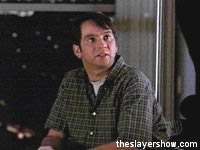 |
Kate has become worn and frazzled from her new mission to take on supernatural evil in LA. Then she comes upon Angel once again putting himself above the law. Angel is not the first person in the history of the world to have loved ones on the critical list. So when Angel refuses to stay at his apartment as a witness to the bombing, Kate reaches her threshold of tolerance.
Kate's obsession with fighting supernatural crime isn't merely about avenging her father's death. It's about staying loyal to the values of the LAPD. She has discovered a whole new side of crime in L.A. that her cop family refuses to acknowledge. As a police officer, she feels it's her responsibility. But taking it on alone may be doing too much.
|
|
|